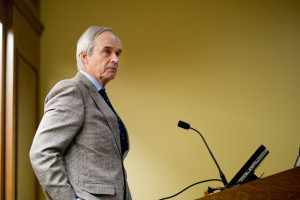
Reform the civil service system to ensure good people fulfill government’s vital roles.
I am writing this brief response to John Dilulio and Dave Lewis in late August, during a visit to New Orleans to participate in events marking the tenth anniversary of Hurricane Katrina. The location is pertinent to this series, because as Professor Lewis mentions in his essay, Hurricane Katrina and its aftermath have come to symbolize government failure. I served as Special Counsel to Louisiana’s then-governor Kathleen Branco during Katrina and saw close up (literally, in a Huey helicopter flying over the Superdome) how ineffective the response of the Federal Emergency Management Agency (FEMA) and some state and local agencies had been.
In his essay, Professor Lewis acknowledges the ineffectiveness of the government’s preparation for and response to Katrina. However, he also says that “policy making by bad example is bad policymaking.” Instead, we should draw lessons from good examples, which is why I and others gathered in New Orleans. Local, state, and federal officials, including FEMA’s fine director, Craig Fugate, came here to discuss how best to organize and coordinate the government’s response to the next hurricane – and, in a larger sense, to assess how resilient and innovative this often denigrated region has become. As we at the Administrative Conference of the United States know well, the hardest thing to do at the federal level is to coordinate separate agency activities. Here in New Orleans, we have three levels of government demonstrating their ability to coordinate with each other. Undoubtedly, this will give rise to positive lessons and provide good examples that Professor Lewis can draw upon in his next class.
Professor Dilulio‘s dazzling data-driven response highlights the contractor problem in government. We do not know if contractors are better or more efficient than civil servants, but we do know that their use has grown exponentially, while the civil service has remained the same size it was during the presidency of John F. Kennedy. As Professor Dilulio shows, we now spend the same amount on service contractors as on the entire civil service. Some agencies are virtually run by contractors. The U.S. Department of Energy, for example, has about 13,000 civil servants and over 100,000 contractors, and I have a feeling that one would find similar ratios at the U.S. Agency for International Development. In these circumstances, the question of who is in charge is one with serious implications for our constitutional structure.
But my experience in government has taught me that to turn this trend around, or even contain it, we need to improve the civil service system itself. Government Executive magazine recently had a front page story headlined: “Can’t Hire, Can’t Fire.” That says it all. As Professor Dilulio well knows, before we can restore civil servants to their proper role in our constitutional system, we must make it easier to hire good people and terminate those who do not measure up. Otherwise, it is too easy for agency heads (who as political appointees have limited time horizons) to work around the sclerotic civil service hiring system by bringing on always-available contractors.
Enough said for now, except that, in my view, this entire The Regulatory Review series should be essential reading for the next president’s transition team.
This essay is the fourth in a four-part The Regulatory Review series, Good Government Requires Good People.






